|

Lake Superior sunrise.
(*photo credit)
January 1, 2013 The Year 2013: A Time for Reflection
Why reflections? Because we have this precious time to make our unique impact on a troubled world, and we need to do our utmost to make the greatest effect possible.
Personally, we need to review our lives and strive to be more meaningful in our prayer life and more determined to live in gratitude, discovering others in need, and helping them whenever we can.
Communally, we live in communities where enhancement of the social capital is called for. Each of us can contribute by attending to issues of local importance and by supporting community leaders working for these goals.
Religiously, we must trust in God and continue a daily prayer life. When we have committed misdeeds we are to confess our faults and experience God's forgiveness.
Conservationally, we ought to review our resource expenditures whether that where we live, foods we eat, or energy required for comfort and travel. All the while we must help reduce resource use in innovative ways. A simple lifestyle can easily morphe into a more complex one with hardly a thought as to what is occurring,we immersed as we are in our pervasive consumer culture.
Intellectually, we can become complacent in our reading and study habits, allowing ourselves to backslide without quiet time required for growth in intellectual pursuits. Furthermore, we need continued education as an essential part of intellectual life and must practice the self-discipline to bring this about.
Physically, all of us need exercise, even when weather is harsh and a good excuse seems so enticing. We have to dress warmly to brave the elements and get needed sunlight and fresh air as well as continue a program of indoor physical fitness.
Regionally, we hear with ever greater frequency that coal miners are losing their jobs and are not being trained to switch quickly to new ones. This is occurring at a far more rapid rate than was thought a decade ago. Our state governments are facing major problems principally associated with spiraling health costs.
Nationally, we must come to terms with a rising debt and the need to render fair taxes by all people, especially the wealthy. Now that the election is over, a citizen's watchfulness is required to ensure that promises and duties are kept and to help bring the military to cost-saving levels.
Ecclesially, we are part of the Body of Christ and need to do more in this year of renewal of faith by spreading Good News, especially to those who have quit practicing their faith.
Globally, we find a troubled world in need of our prayerful attention. Are we aware of conflicts in the Mideast and are we willing to pray for peaceful resolutions? Are we concerned about human-caused climate change and how it will impact the poor?
Prayer: Lord, give us a sense of freshness needed to begin this year, 2013. Help us to renew our spirits and prepare to take
on our responsibilities with greater energy and enthusiasm.

Quiet moment of the dove.
(*photo credit)
January 2, 2013 Great Expectations for the Year
Think small and we expect little; think big and we may make substantial gains. Here are some 2013 expectations:
Gratitude is publicly given for Gifts received -- An ungrateful citizenry is intolerable. As a people we need to give public thanks for what God has done, and we must reaffirm our national motto, "In God we trust."
Peace comes to the Middle East -- We enter this year with the clouds of war hanging over much of that troubled region and the horror of continued civil war in Syria; this conflict has taken many lives and may escalate into a regional if not global conflict.
Freedom of religion is ensured in our world -- Even in this country of a tradition of freedom, religious exercise is being threatened in many ways, and these practices are to be exposed, challenged, and curbed.
Renewable energy grows in strength -- Wind and solar have shown marvelous growth in the past four years, and we expect these soon to become one-quarter of America's total electricity sources.
Fair taxes are expected by all -- May the new Congress along with our president come to an amicable agreement on fair taxes so that the wealthy will pay their fair share to reduce deficits and launch an infrastructure improvement program.
Drug use declines -- It is time to eliminate advertising of legal drugs and to legalize but strictly control marijuana use. May enforcement officers be diligent on what they need to do.
Ivory trade and whaling are strictly banned -- For the sake of the dwindling elephant herds it is necessary that all nations, especially China, adhere to a ban on trading in ivory so that poaching will be curtailed. Whaling must cease as well even by so-called "research" expeditions.
Prisons are reduced in size -- Non-violent criminals ought to be enrolled in work-release programs so they may live in their own communities and help in supporting their families.
Jobs are made available for all -- It may sound odd to some in our current greedy and competitive culture, but it is the government's duty to be the employer of last resort.
Consumer culture is challenged -- A serious effort is made to discover the basis for a new economy based on genuine needs of the poor here and in other nations.
Health care is properly funded -- Everyone has a right to proper health care and it is not a privilege of those with wealth alone.
General care procedures need to be put into place this year.
Natural gas extraction is controlled -- Leakage of drilled and processed natural gas could exacerbate the climate change problem because of the strong global warming effects of escaped methane.
Crops are abundant this year -- Much depends on good cooperative weather conditions and the skill of farmers to grow the crops required for essential needs. Let's pray for adequate rain.
Prayer: Lord, give us courage to confront problems facing our world, and to work together to solve them as people of good will.

Eastern box turtle, Terrapene carolina.
(*photo credit)
January 3, 2013 Environmental Themes for Each Month
Let us start each month with a particular environmental issue. We may find that each month can have a special topic worth focusing on and thus improve environmental awareness. You may decide to rearrange subjects, but the exercise is worth attention:
January -- Indoor potted plants deserve special notice. We need to see up close the mystery of living things within our residence and places of work, study, recreation, and worship. This close observation gives us encouragement to continue in our routines. Furthermore, indoor plants can remove toxic substances from the immediate indoor environment.
February -- Solar power is this month's theme because we start to feel the warming rays of the sun in our sun-starved winter world. We know that solar energy is there for the taking, needs to be collected and utilized, and is worthy of celebration. We are like moths attracted by the light.
March -- Wind in breezy March makes us aware of the contrasting destructive power in a tornado and benefits; these range from harnessing wind for human use in many applications from water pumping for irrigation and for livestock, to generating electricity for everyday use in factories, schools and hospitals. Wind is at our disposal, another gift worth our proper investment.
April -- Water splashing upon us in the middle of a shower makes us very aware of this life-giving substance, so essential to our lives. Water is also destructive as a flood or a rising ocean level, and water's lack in drought times is keenly felt as well. When properly harnessed, pure and plentiful water benefits all of us in many ways. Easter water becomes the sign of our baptismal vows and desire to make the world a better place.
May -- Flowers in Mary's month tie us closely to the reawakening Earth. The time of resurrection and expectant Pentecost is one of buds, blossoms, wildflowers, and greening of meadows and lawns; their exhilarating sight and delicate scent sharpens our senses to the fragile nature of all Creation. Jesus is risen and is present in our midst, and so we rise with him. Gardens, God's favorite places, beckon us to full cultivation, and challenge us to intermingle vegetables, herbs, and flowers.
June -- Wildlife fills our life with joy and refreshment. Songbirds and raptors, squirrels and rabbits, butterflies and lightning bugs, all carry a message worth rediscovering in early summer. It is time to detect their presence, protect those most beneficial, respect and repel those that can bite, and control their breeding places for the good of all. It's time to learn about indigenous wildlife that graces our local vicinity.
Prayer: Lord, help us focus on environmental aspects of our lives and to share our knowledge with others.

A close-up look at a section of decaying wood.
(*photo credit)
January 4, 2013 Monthly Environmental Themes Continued
Let us continue our review of special issues this year:
July -- Community Relations may be better practiced in this month of Independence Day, needed retreats, special festivals, communal celebrations, and family reunions. Does our community and home exude hospitality and welcome strangers?
August -- Land-forms (mountains, deserts, rock formations, valleys, and plains) may be more deeply experienced during vacation time. These under-noticed surroundings give us bearing and direction, and are the record of our place's geological history. The feasts of the Transfiguration shows us the "hereness" of the risen Lord and the Assumption speaks of God's invitation for us to be blessed by participating in the act of divine glorification.
September -- Buildings need to be winterized, as scurrying wildlife tell us. Late summer and early fall is the time to attend to checking our residences and places of work for possible leaks. Besides taking energy conservation measures such as adding caulking we ought to compost yard wastes, and prepare for winter gardening.
October -- Trees speak their own sermon in brief autumn's painted landscape. We note their size and type and variety. Trees a real part of our lives and provide fruit, wood, climatic modification, wind and sun protection, prevention of soil erosion, and a host of other benefits. Furthermore, they are beautiful and many far outlive us on Earth. Should not more attention be given to the protection of our forests from pollution and destructive forest harvest practices?
November -- Food of special types (turkey, cranberries, pumpkin pie, etc.) are part of the American ritualized Thanksgiving meal. Whether we are of rural or urban backgrounds, we are aware that the harvest time ends and the year draws to an end. We are moved to give thanks for our lives and comforts. Giving thanks to God is Eucharist -- and that is a heavenly banquet -- the foretaste of things to come. In receiving this sacrament we are all the while aware that others suffer from poor nutrition and famine. We are drawn to ask ourselves: Do we tend to eat higher resource intensive foods such as red meat and processed foods? Are we willing to share our bounty with less fortunate people?
December -- Indoors atmosphere is the portion of our environment that is quite critical to quality of life but often neglected. This is the most unregulated and polluted part of our total environment -- and with novel home-cleaning products and tighter ventilation controls air pollution problems grow. In a proper home environment, smoking is forbidden, houseplants purify air, and chemical products are severely limited and controlled.
Prayer: Lord, help us to honestly face our environmental deficiencies with monthly reminders so that we become more aware.

Snowfall on Kentucky stream.
(*photo credit)
January 5, 2013 Reflection on the Sights in January
Throughout this year we will include various selections from our new digital book containing Warren Brunner's black-and-white photographs, entitled Appalachian Sensations: A Journey Through the Seasons. We try to catch some of the many daily perceptions from the various senses and discover their differences in various parts of the year. Places, times, and those with whom we are associated add to the pleasing sight, sound, aroma, flavor, and feeling that give quality to our lives and the ready means wherein we can come to ever deeper gratitude. These reflections are meant to be a promotion of the new book, with its many photos enhancing the texts presented here. We hope you will obtain and share these black-and-white photos and writings with others.
Sparkling Snow-Covered Hillside
God gives an order, divine word flashes to earth:
to spread snow like a blanket, to strew hoarfrost like ashes,
to drop ice like breadcrumbs, and when the cold is
unbearable,
God sends word to bring the thaw
and warm wind to melt the snow. (Psalm 147:15-18)
A snow-covered landscape is the Creator's masterpiece,
each snowflake a different design, each curved snow drift and
bank a work of art. The sight is a jewel to be gazed at from a distance, without daring to step out and disturb the almost perfect
landscape. Well, not quite undisturbed, for cottontail's tracks are there and other wildlife will surely follow soon. This fresh blanket of snow is like the cloth placed over the coffin as it is brought to the church, preparing the baptized person for the journey to eternal life.
For a brief moment the world seems perfect. Snow covers over roadcuts, stripped hillsides, and clearcut forestlands. Abused land is removed from sight. The clean covering of a suffering land recalls the divine promise to cleanse us of our faults, to make us pure as new-fallen snow, and to give us new life. Snowfall in January signifies forgiveness and rebirth. Let us glory in this short-lived scene, this promise of a New Heaven and New Earth, this Epiphany of God among us.
Prayer: Lord, give us a sense of the hidden beauty of this month in the "dead" of winter. Help us see in the shapes and shadows, the subdued colors and hues, the increasing daylight and winter crystalline hope, a spark of new life that is emerging in the troubled world around us. Let us not be frozen in our past ways but willing to find the often hidden energy that tells us that even in winter life is starting anew.

Blooming indoor geranium, adding floral color to January.
(*photo credit)
January 6, 2013 Leading Others to Epiphany
On this feast of Little Christmas we return to themes of twelve days ago and see once more the celebration of God's gift to us in the Messiah's coming. In this troubled world many cultivate a sense of confusion and helplessness; they withdraw into themselves and attend to daily cares of fulfilling wants and being mindful about their health and that of loved ones. In some ways, our country and localities suffer equally from similar problems -- a turning in and thus becoming so engrossed in personal physical cares that the broader neighborhood and world is cut off from purview. In such cases self-interest reigns supreme.
Epiphany is God's appearance to us as a helpless infant in a stable. It is a pilgrimage in selflessness. In the simplicity of this momentary event we pause; we see beyond ourselves; we gaze upon the poor and we adore the Creator of all. This grand appearance moves us out away from self as it did the Wise Men who traveled far to see the infant Jesus. Christmas suddenly becomes more than a local event in Bethlehem to Jewish people; we gentiles are moved to discover the power of God including us as chosen people. Our following the star of guidance is a spiritual event. Spirit as light leads us on our journey of faith to be aware of God's presence in unexpected places and times amid people with whom we share the global commons.
Let's go to where the Lord is found and sing a hymn of praise. Let's create space in our individual and collective hearts for God to come and be present to us so that we can become present to others. Let's assist in discovering open spaces in a troubled world where God can be recognized by all. Materialism has a way of crowding out the Spirit, or at least the utter desire for a Spirit-filled life. Through a new Epiphany we help create a need for the Spirit, not so much through negatively denouncing material things (for we all need material food and lodging as essentials), but by positive acclamation of the need for God in our everyday life.
In our culture, Little Christmas is regarded as secondary to the December 25th Christmas event, but today has a profound theological and spiritual significance for us. In December we focused on the actual coming of the Incarnate One into the world and our simple adoration with shepherds on late Christmas Eve. Little Christmas is the singular act of bringing a broader world to God. We cannot change the entire world, nor has anyone ever succeeded, but we can do one little thing well at a time. Today, we resolve to approach confused folks we will meet this year, and offer them Good News, a guiding insight and light, a cheerful word, a prayer of deliverance. We further resolve to direct people away from the false materialism and greed that so saturate our world, and show them Christ's simple but star-brightening way.
Prayer: Lord, give us the faith to see that we can work in simple ways to change our bewildered world in new directions. Help us believe in an Epiphany that we celebrate throughout the year.
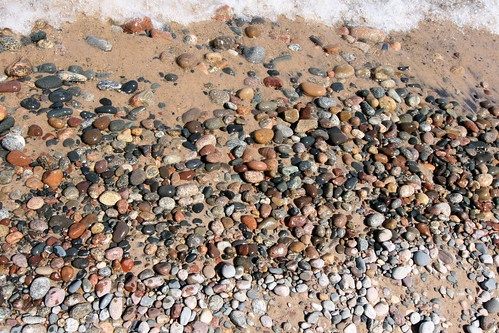
A colorful assortment of weathered pebbles.
(*photo credit)
January 7, 2013 Today the Death Penalty Is Uncivilized
Kentucky's death penalty system is broken. Repeal: fix it permanently! Kentucky Coalition to Abolish the Death Penalty
Human civilization advances in sensitivity to issues such as dealing with crimes and punishment in better ways. In former ages, the civil concern was reducing inhumane types of death penalty (crucifixion or "drawing and quartering"); these involved glee associated in administration and spectator-gazing at the scene of execution. We have come a long way in incarceration alternatives as a means of punishment. In fact, most civilized nations with few exceptions (especially China, Iran, and thirty-three of our states) have abolished the death penalty.
Why are our states (including Kentucky) cast in that uncivilized section of the world? Can't we do better? The states of Alaska, Connecticut, Hawaii, Illinois, Iowa, Maine, Massachusetts, Minnesota, New Jersey, New Mexico, New York, North Dakota, Rhode Island, Vermont, West Virginia, and Wisconsin are now without the death penalty. Why not the other thirty-three? We wrote that abolition time is now (October 23, 2009) and that it is a Right-to- Life issue (December 19, 2009). I feel a local community urgency because one of our residents (though not a church member) is on death row, and the U.S. Supreme Court refused to give Ralph Baze a stay of execution. He should have never been condemned to death, and parishioners who knew his victims well still, to their credit, advocate abolishing the death penalty.
The Kentucky Assessment Team on the Death Penalty consisting of legal experts found that serious problems persist in state death penalty procedures:
* High error rate in death penalty cases;
* Inadequate retention of evidence;
* Law enforcement inadequately protects against wrongful conviction (false witness identifications and false confessions);
* Inconsistent application of death penalty;
* Juror confusion;
* Low pay for public defenders;
* Unqualified defense attorneys;
* Inadequate protection for the mentally disabled; and
* Lack of date-keeping throughout the administration of the death penalty in Kentucky, making it impossible to guarantee that the system is operating fairly, effectively, and efficiently.
The assessment team made a number of recommendations; however, are these really guarantees that this will make death penalty administration fairer? Justice is not being served for prisoners on death row, certainly not if forced confessions, lack of adequate defense, mental incapacity, or because poverty is involved. Let's stop such practices and advance in civilization.
Prayer: Lord, give us the courage to confront the prevailing cultural systems that are faulty in administrating justice.

Listen for droplets of melting ice from pine needles.
(*photo credit)
January 8, 2013 Winter Water Sounds
Even in winter we are aware of water in its many forms of rain, sleet, snow, icicles, ice covered ponds, trickling brooks, waterfalls, and waves at the seashore. Not all of us live where we have access to large bodies of water. Is it possible to hear ocean waves crashing on our shores or cascading streams or waterfalls? We make due with limited water sounds -- while our hearing lasts.
Winter weather can be violent even when it is not the normal tornado season. Major floods can occur in January, and so can sleet and ice storms. But gentler water sounds are more common in this month: granulated snow/ice hitting the window pane if we are safe at home. Winter rains sound comforting but can be worrisome for those on the road or impeded in mobility. But natural gentle sounds of gurgling streams and melting and falling icicles are all music to the ears. So is the crunch made by shoes on the frozen landscape.
January is an indoor month, and water sounds are related to moving water within our dwelling. The sounds of a running faucet, a flushing toilet, or a splashing shower are so routine that we are hardly alert to the sounds. What about the noise of a simmering cooking pot, or the hissing of a teakettle, or the clanking of a steam radiator? The season has a way of accentuating water sounds. If these are lacking, how about adding to indoor water music by installing a bubbling system for fish tank or indoor "waterfalls?" Water sounds give quality to our lives -- and spending winter mostly indoors is when life ebbs without positive reinforcement. Perhaps we must go outside to really appreciate winter sounds.
Snow-Sledding Paradise
The squeals of delight are part of the chorus of living beings. The coyote's howl, the ruffed grouse's thumping, and the owl's hoot blend with the excitement voiced by youth at winter play. All creatures praise the Creator through winter sounds unmuffled by summer foliage. Sled riding adds to the chorus of creation: birds and animals seem to be awakening the plants and trees so that sap will soon start to rise. All creation beckons us to listen carefully, for winter sounds spark immense contrast. At times they are unhindered and carry for miles. Then when snow falls a profound silence settles in. Falling and fluffy snow acts as an acoustically sound-proof space for us to reflect more deeply. We have time to listen, and listen, and listen. God speaks in gentle breezes and even in falling snow. A spiritually-tuned ear can start to distinguish among nature's winter harmonies.
From: Appalachian Sensations: A Journey through the Seasons.
Prayer: Thank you, Lord, for life-giving water and the sounds water makes, especially those that add to life's quality and make it more harmonious.

Manganese nodules in lump of clay. Fayette Co., KY.
(*photo credit)
January 9, 2013 Reforming the Academic System
On April 26, 2012 we inserted a reflection of "Lectures, Academic Rip-offs, and Free Education." Let's review the multiple issues that place modern education at a crossroads:
* growing demand for higher education on part of all;
* escalating educational fees beyond cost-of-living raises;
* growing indebtedness by many students;
* failure to retain teens in schools for lack of concern about traditional education and the dearth of technical training for those who are in need at the high school level;
* inability to find jobs to help repay school debts;
* new alternatives to weak forms of education; and
* a critical review of for-profit institutions.
Now let's add some additional factors that touch even the more legitimate educational institutions:
* professionalization of academic sports at certain places;
* wasteful academic buildings demanding ongoing maintenance;
* high-salaried CEOs running academic institutions;
* sports coaches with seven-figure incomes;
* unqualified athletes in "farm school" settings;
* energy and resource waste in dorms;
* donations by the wealthy who dictate that the critique of the capitalistic system is off-limits;
* researchers with little concern about teaching students;
* ineffective lecture methods carried over from Medieval times when books were scarce and notes had to be copied by hand;
* need for the party card of an academic degree; and
* unions that lock in teachers who may need to be dismissed.
Actually, listing of problems is not sufficient (see next three reflections). First, educational problems need to be subdivided into economic ones related to students, use of academics for non-academic goals, and alternative methods that would compete properly with traditional academics at a higher level. Certainly, elementary education problems differ from higher education ones.
One alternative is for private education to exhibit viable alternatives. Private schools exist through investments as well as donations by charitable individuals and tuition by willing parents and students. In both public and private systems, critics are starting to emerge to attack pure lecture methods and suggesting new approaches to research. Taxpayers, parents, and labor unions are more realistic in seeing just demands on teacher quality and compensation. Over-emphasis on sports and resulting physical injury and other abuses are urgent matters. The high price of education by those outside of scholarship ranks is causing all taxpayers to rethink a growing inaccessibility by lower-income folks. Critical academic reviews are starting not any too soon.
Prayer: Lord, inspire our Jesuit Society and other private educators to address the high cost of education, inaccessibility of quality education by the poor, and a need for free universities.

Appreciating wood patterns on cold January day.
(*photo credit)
January 10, 2013 Are Free Universities Possible?
The poor and middle class are being frozen out of the best and medium ranking schools due to high-tuition costs; add to this a lack of assurance of jobs while graduates are saddled with huge debts that will take years to repay. The modern system of education is increasingly becoming a privileged preserve of the wealthy with many middle and lower class students falling by the wayside. Perhaps the time is right to champion a free university, a dream that can be lost in the for-profit world all around us.
Many in this country speak of the need for a higher education and the eagerness of many for skills in an ever more complex world. Granted, MIT and other institutions offer Internet courses of which, upon meeting the requirements, an online student could receive a certificate indicating that the course is passed. The same procedure now occurs among new online university courses given by Internet-based higher education bodies. The question is more one of acceptance and certification of the respective course. Consider time required for travel, lodging, and physical classroom meetings that could be saved by learning at home and at one's leisure. Recorded lectures could be replayed until the student comprehends the material. Note-taking ceases to be the important skill and diligence at one's learning pace becomes critical.
This free university concept works better for certain fields of study over others -- economics, mathematics, sociology, philosophy, history, theology, literature, and many other classroom-oriented fields. Interactive conferences can be achieved as easily by Internet as in a given physical location. Those subjects demanding laboratory work such as language, linguistics, physical sciences, and applied aspects of medicine, law, and social work will require more than online lectures. One could reach beyond the Internet: library science could be done in conjunction with libraries, astronomy with observatories, biological sciences with botanical gardens, and on and on. Furthermore, supervised laboratory experience could be obtained for practical arts and sciences through apprenticeship programs paid by governmental grants. Skills learned in laboratory courses could be achieved through technical school structure for high school students.
What about the professors needed for free universities? One major source is the retired professor pool, who would find it far easier to be taped rather than traveling to a special time and place at an institution. Donations by the recipients may not prove a satisfactory funding source for professional experts who could acquire and dispense expertise as a side project to their own occupation. However, a repayment for government-funded research could include a demand for public service within a free university. Be assured, these ideas will be opposed by many who feel no responsibility to "repay" governmental grants.
Prayer: Lord, give us the courage to promote ideas that counter outdated education models and address current needs.

A buckeye, yet undiscovered.
(*photo credit)
January 11, 2013 How About a No-Frills University?
If universities cannot be free, at least costs could be cut.
Why pretty campuses and bloated bureaucracies? A sizeable part of tuition is the infrastructure of academic life and all that this entails: massive buildings, academic centers, management offices, grounds management, and on and on. Why such manicured lawns and beautiful buildings? Is it to make donors happy?
Live-at-home students: Institutional living circumstances demand an array of mega-dorms and their maintenance, policing and managing staffs, athletic facilities for free time, extra parking and safety facilities, eating places and abundance of variety for the students, and a host of auxiliary services. These are nice for allowing the youth to get away from home, but they are expensive.
Stop sport recruitment and get serious. Last year, virtually the entire University of Kentucky freshman basketball team moved on to professional sports. Why come to college in the first place? We find the extra expense of stadiums and athletic staffs and high- paid coaches (highest salaries in our state) along with TV rights to ball games and the entire mega-sporting infrastructure as having virtually nothing to do with true education and research.
Divorce research from teaching. Very little can be said for some forms of university research that allows the conducting person to receive compensation while supposedly teaching. Often it is the underpaid research assistants who do the teaching, even though they have less experience and must salvage time to complete their own work. This is not meant to be an attack on scientific research but ought it to be done on campuses with inflated lodging and sporting facilities and expensive grounds? Research parks need not be directly situated at universities to still enjoy collaborative research activities. Proximity of the academic place to a research facility is not so important in this interconnected world.
Why classrooms and sleepy students and droning lecturers? The lecture method is outdated and is the outcome of a Medieval university system where notes could not be transcribed in pre-printing press days and had to be dutifully taken by those who listened to the teacher in a face-to-face situation. However, both the available printed word and the digital word via Internet make all of this lecturing and note-taking out-of-date. A properly arranged set of notes plus a view of the professor on a television screen could be a great savings for all parties in travel time, parking, and assembling in a classroom. Through advanced technologies classrooms become less and less important -- and ought to be abandoned at the time when teleconferencing and interactive class via Internet are widely practiced.
Prayer: Lord, teach us to be willing to offer and obtain access to a free university where people can truly learn at far less financial expense.
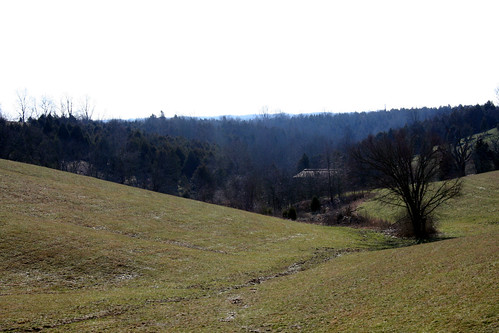
Rural farm scene, Washington Co., KY.
(*photo credit)
January 12, 2013 Donations within a Democracy
Donations are a part of the workings of a democracy. Much of our world of arts, public radio and television, religious institutions, occasional celebrations, private academic centers, environmental groups, health research, libraries and museums, political campaigns (outside of the mega-buck rackets of recent years), and civic and fraternal organizations are run on donations. Keeping the non-profit world functioning depends on influencing people to give to worthy causes. This is a key to success and ought not to be forgotten. In fact, the ability to attract the donated gift is the hallmark of a successful director of many projects and programs. However, is this not somewhat overblown at times through padded expense accounts?
The role of donations must not be overlooked. Through the donation the life of future projects is determined. However, we ought not to expect success in the hands of those who can afford to donate. When donated funds are guaranteed, this opens the door to lack of ambition and pursuit of greater excellence; when over-competition for limited financial resources occurs this leads to dishonesty in reporting. The blizzard of calls for donations makes us review where we give and whether support for a given cause is important enough to take notice. Let's be critical in what is achieved with our donated funds.
Charity as service is for all to consider, for charity ought not to be the domain of the wealthy with excess funds. The benefits of a project must include raising the welfare of everyone. Far better is to give of ourselves in whatever way is possible, for the better spiritual civic and political life of the community. We cannot discount the process of attracting donations, for often the cause becomes clarified, the actual working is streamlined, and the benchmark of success is more reasonable when accounting is called for. We are aware of the need to do good work, to fulfill promises, to report honestly, and to use resources properly. Being mindful of the intent of donors can be good or it can be a weapon by charitable givers to keep recipients within a particular groove.
All should donate something of what they have for the benefit of others. This is why in-service work for the poor could be part of public education, once a young person is able to give service for others. If one receives public primary and secondary education, then the maturing recipient should be assigned or help choose an in-service project such as cleaning up the community or assisting the elderly or immobile. This type of in-service donation should become part of all people's lives and, as long as we are able to give of self, an in-kind "taxation" allows those of less income to give in non-monetary ways. Instead of expecting the rich to give, make them give in fair taxes, but expect ALL to give.
Prayer: Lord, incite us to be generous with the gifts you have given us and to parse out our funds and services to those in
greater need.

Rushing waters after winter rain. Woodford Co., KY.
(*photo credit)
January 13, 2013 The Importance of Our Baptismal Vows
God's grace has been revealed, and it has made salvation possible for the whole human race, and taught us that what we have to do is to give up everything that does not lead to God, and all our world ambitions; we must be self-retrained, and live good and religious lives in this present world... (Titus 2:11-12)
Each of us enters the Christian community by taking on vows individually (or by sponsors in the case of infants in anticipation of affirmation when reaching the use of reason). We vow to renounce the allurements of the evil one and to place our minds and hearts on a journey to God. While the goal is clearly before us at our initiation, we are at God's mercy when we falter. Yes, Baptism is a worthy grace-filled beginning. It shows the greatness of God's gift, the unique task placed before us and the promised reward when Christ comes again.
The Baptism of Jesus initiates his ministry; our baptism initiates ours as well. This preamble of our journey of faith anticipates a path of dedication and effort. We become like Christ in his ministry of care for others. "Awaiting" Christ's return involves our activity, encouragement and direction for the wayward, stimulus for the lazy, and support for those who are exhausted and tempted to halt.
The ordinary year is beginning today. It is not of lesser importance than the extraordinary events such as our Baptism. We need events and we need to be faithful to the everyday flow of our lives. Here, ordinary means that we are willing to count weeks in a regular sequence starting with this Sunday as number one. All of us crave a certain routine so as to conserve our limited resources -- when we sleep, eat, exercise, work, pray, and relax. We need a regular order and can even become distraught when unexpected events disturb that regularity of our internal biological clock.
The extraordinary nature of Baptism startles us. Each Easter when these vows are repeated or at an individual's reception into the Church, we are somewhat shocked at how definitive the vows are. Do we take these vows seriously? Are we willing to read the Scriptures and discover how Jesus spent his time in his earthly ministry doing good for all? We note that he withdrew to pray and we ask ourselves whether we are prayerful people in these troubled times. We see troubles and can lose heart; we can forget that our prayers are heard if we but have faith to continue begging. The launching forth at Baptism comes with a rush; continuing the vowed life requires an ongoing energy source, namely the sacraments. Awaiting the Lord is our special and fleeting time of preparation. Yes, we have not been perfect, but corrective measures are before us, for the Spirit is our GPS allowing us to return to the road leading to our promised goal. This is all part of Baptismal vows.
Prayer: Lord, help us to take more seriously the vows made at Baptism, and to see that we are committed to living them fully.
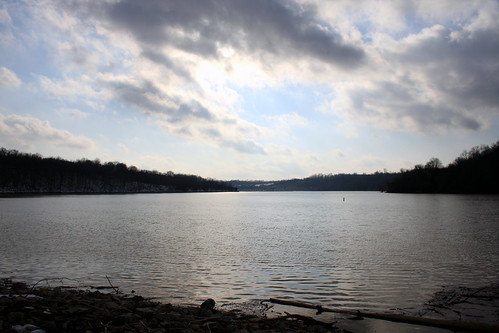
Winter shoreline of Taylorsville Lake, KY.
(*photo credit)
January 14, 2013 Arctic Ice Cap Shrinks Rapidly
In reading history we learn about the immense effort by Europeans such as Henry Hudson and other explorers to find a Northwest passage from Europe to Asia. The hopes in traversing frozen wastes and islands and inlets of Canada was for a safe and economic route that would shorten immensely the traditional Oriental routes around Africa, or by using Middle East land and water routes -- and be an extremely lucrative commercial trade route dominated by England. Our dreams of a few decades ago were that if the Arctic ice sheet retracts for a period each year, the traffic could flow in half the time and distance "over the top" between Europe and Asia. Such dreams are now becoming reality.
The Earth Policy Institute published a report in the autumn that in spring and summer of 2012 the Arctic lost 11.8 million square kilometers (the size of U.S. and Mexico combined) of ice cap due to warming and melting of this protective cover, more than any year since measurements began in 1979. This made the residual ice cap 18% smaller than the previous record of 2007. The study reported that only a quarter of the ice surviving the summer melting period was over one year old. In a mere five years the minimum volume of Arctic ice has halved and this is even a more drastic change than the reduction of the summer surface change. See www.earth-policy.org/data_highlights/2012/highlights31.
Most of us are aware that a melt cycle always occurs when Earth tilts to the sun in Northern Hemisphere spring and then recedes and freezing restarts in the fall of the year. The melting process exposes more of the dark liquid water that absorbs more light than the reflecting of sunlight by the ice. Thus, a global warming effect is accelerated and ice reserves of the planet (glaciers and the three-thousand-meter ice sheet of Greenland) melt all the faster. Should that Greenland ice sheet completely melt, oceans would rise seven meters, inundating oceanic island nations.
If the rise in this century were only one-tenth of the possible amount due to Greenland melting, the results would be devastating for the multitude of coastline, urban as well as rural areas. Worries extend to Florida where recently 150 scientists signed a statement of concern because of the ocean rise of eight inches in the past decade or so. For them and many more of us, ramifications of this rise are immense. Climate patterns are definitely changing and these are affecting maritime coastlines. Can the melting rates be reduced or checked through controls on greenhouse gases, especially the release of methane from natural gas drilling and processing? Furthermore, methane release from melting of the Arctic permafrost triggers a feedback effect accelerating the ocean rise. The issue involves future generations and results in costs far greater than beneficial trade routes.
Prayer: Lord, give us the courage to see the signs of our times, and to speak up about them in a realistic fashion so that all listen and all heed the call to simpler living.
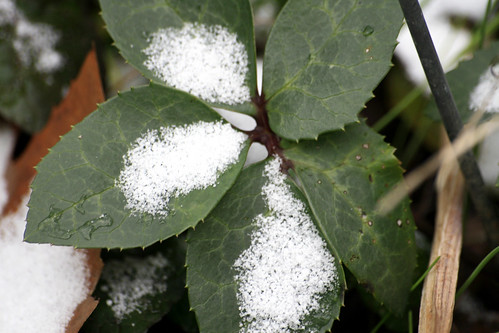
Snow on hardy helebore.
(*photo credit)
January 15, 2013 Ethnic and Ecological Consciousness
Ethnic awareness is part of environmental awareness -- our homes and community structures, our interactions with friends, our recreational and educational choices, our tolerance for weather changes, our celebrations and joys, our religious worship and ways of conducting and participating in funerals and weddings, and our many interrelationships -- are frequently rooted in our ethnicity or in the collective ethnicity of a community. How we solve problems as a democratic people in part depends on the social capital in which we are helping to shape and in which we have invested much of ourselves. The way we practice our democracy and our sense of civility is partly an inherited pattern coming through participation in a democratic community. So is our ecological ethic a part of social capital, namely, the way we treat livestock and wildlife, soil and trees, people and Earth herself.
Ethnicity enters into our current public interest issues and ought not to be neglected, for we all have differences both as individuals and as members of a community. As the ethnic composition changes over time, we can become reactionary and entrenched in our traditional ways, even detesting recent arrivals and their contributing ethnic characteristics. We are members of families with ethnic traits and still are also participants in communities that have absorbed a variety of such traits to start new ethnic groups that emerge over time.
When we delve more deeply we find that merely identifying with a certain ethnic group through answers to a census-taker is not the whole story. We may identify our personal preference as far as subjective knowledge allows for an honest answer, but are unclear as to which portion of a mixed ancestry we ought to declare. One who is non-Germanic in a heavily German community may be willing to be assimilated and join cultural groups so associated, or may wish to express differences by reaffirming one's roots. Resistance may be difficult and we will allow majority views to go unchallenged in matters of economics, social life, or politics.
Some regard their ethnicity as personal and do not want to discuss this with others. Others will take pride in telling stories of forebears and heroic efforts in settling, raising their families, service to the country in times of war, and conditions they had to bear to be accepted by others. However, others dismiss ethnicity as unimportant and prefer to blend in without specific notice. Some ask, "Why do you need to know?" Delicate subjects demand proper introductions and discovering ethnicity is one of these. Recall that some people would not like to uncover family history, or regard their own ignorance as a failing for not interacting better with parents or grandparents while they were living. Instead, ethnicity comes with a tinge of remorse, shame or blame. People are concerned about the threatened or endangered, whether plants, animals, languages, or ethnic groups.
Prayer: Lord, teach us to value all our ethnic groups.

A great-great grandmother's favorite flower.
(*photo credit)
January 16, 2013 Pride in Ethnicity and Being American
On Religious Freedom Day we need to reaffirm our citizenship and love of our freedoms in America. The U.S. census-taker or population surveyor allows people to give their first and second ethnic estimations. Some find this worrisome and annoying, even when guaranteed that individual identity of persons will not be available for commercial purposes. Often people respond quickly and may even give slightly different answers as to ethnicity questions if asked later. The total accumulation of vast amounts of national information makes for a comprehensive picture, which perhaps approximates a true picture by the law of averages. Granted, data collectors can make sampling errors, still most are conscientious and we have a relatively good approximation of an authentic American ethnic picture. Certainly census information from Georgia does not resemble that of Vermont; nor does the Texas ethnic picture resemble that of North Dakota's. The result is a relatively true composite picture for a given time.
Several decades ago an account appeared of an Irish-American infant who was raised by an Amish community and became part of it. This is a case of transferring to another ethnic group after birth and could occur through adoption, marriage, or even personal associations. These trans-ethnic occurrences are more common than at first glance. When people marry into another racial or ethnic group, the stronger and more enthusiastic party generally governs the attachment to a particular ethnic group.
We enjoy celebrating with others and thus become a little part of their ethnicity when we partake in their good will and cheer. Is this a "melting pot" effect or the American acceptance of the stew of ethnic variation? Tolerating diversity makes us more globally centered and breaks down the biases and stereotypes that are often associated with certain groups by overly closed clans and families. In becoming acquainted with diverse ethnic foods, dances, costumes, and celebrations we grow in the treasures of other cultures, we continue to be hospitable and we refuse to demand uniform conformity in thought patterns.
Ethnic pride fades with groups or through the years and perhaps is replaced by specific "regional" ethnicity. Some people prefer to be called American instead of one or other standard ethnic-rooted categories. These numbers are part of a category that is present in large numbers in Appalachia, the Ozarks, and portions of the Southeast. Is this a lack of ethnic consciousness or an absence of a proper cultural category for response? While "Pennsylvania German" is one such ethnic grouping based in part on land of origin, Ozark or Appalachian people are forming a cultural unity from diverse backgrounds over several generations. Many from these regions declare themselves American, but numbers are not growing as fast as the rise of Hispanics and Asian Americans.
Prayer: Lord, give us a sense of worth in our cultural
background, to discover good traits and to pass them on to others.

Ice-covered branches to greet the morning sun.
(*photo credit)
January 17, 2013 Ben Franklin and Defense of Democracy
On the birthday of Benjamin Franklin, a statesman and founding father of our country, we need to highlight some of his contributions to our society. Franklin lived at a time when there was perhaps a greater sense of equality and opportunity than in recent years of our Republic. He was one of the elders at the framing of the Federal and Pennsylvania Constitutions and spoke with wisdom of the nourishing of democracy of which framers were deliberating. He sought mightily to limit the wealth of individuals, for in his wisdom he realized that a disparity of wealth would poison democratic process -- and yet he was utterly defeated in his suggestions -- the ranting of an old man.
Democracy involves freedom but not license. Unfortunately, we continue to be ignored in suggesting Franklin's noble but unsuccessful attempt in the face of an aristocratic group dreaming of wealth and greater material security. Too few citizens then or now listen to the Christian message. Jesus says to forego material wealth for spiritual dimensions and to find here the way to security through profound sharing with others. The greed of uncontrolled wealth in the hands of a few is toxic and will harm a democratic system. Today, with fewer opportunities open, wealth allows the privileged to continue to grow and the poor to remain.
Democracy is fragile and easily compromised. Our democracy needs to have a vigorous foundation on which people with proper motivation can continue to prosper. Wealth is not wrong when controlled and in the hands of the democratic commons. In an autocratic society, efforts may focus on getting autocrats to be generous. In a democratic society, efforts need to be different; we must be vigilant and strengthen the workings so that the materialistically-inclined will be controlled by good legislation and regulations. Excessive wealth must be redistributed.
Wealthy plutocrats will ruin us. The American dream can at times be as immature as a greedy youth wanting all the candy that he or she can grab. The dream needs a realistic dimension and limits to wealth. A laissez faire dream is the wrong approach for it omits instituting proper controls and overlooks existing regulations. Through monetary power the wealthy can buy the legislators, attract their attention, and influence the manner in which controls or their lack is fashioned. Perhaps Franklin realized that the wealthy were exercising excessive power even over the framing of a federal or state constitution -- and they were. If we are to fashion controls for trade and security, then funds would be needed, and those who oversee funds would have a greater influence on government. How can we preserve true democracy?
What is the answer? Limits are needed for all material things and that includes money, land, and other forms of physical wealth.
Prayer: Lord, inspire us to be achievers but to do this in
ways that promote democratic teamwork and sharing of resources.

Earthworm, delicately tucked under the wood's bark.
(*photo credit)
January 18, 2013 Churches Coming Together Ecumenically
Today is the start of the Unity Octave just one week before St. Paul's Day. During these eight days we pray for and envision the unity of all Christians. Is this possible in our age, a coming together of people of various branches of Christian belief to testify to the unity of Christ in our world? Certainly, faith in God means we see all things are possible with God -- and we believe our sincere prayers are answered. From disunity we are encouraged to grow towards oneness through prayer and other works.
Research together. Cultural differences led to many of the movements of disunity in the course of human history. We did not understand where the other party was coming from and this led to misinterpretations and ultimate misunderstanding (Greek and Latin differences were examples involving theological and manner of governance issues that hardened over time). Furthermore, grievances caused by political and nationalistic differences fermented divisions that solidified over time and even led to wars. Theological differences caused long-term frictions. Today, reviewing historical divisions in a more neutral and unemotional manner helps us make progress at the table of discussion. Historical and theological research has closed differences such as the reformation's contentious point of faith and works.
Work together. Shared social goals lead to unity. We can work together even when differing in doctrine because we share the need to address poverty in a unified fashion. Through love for all, we come to a common act of dispensing charity. Christians hear Jesus saying that those who do things in his name cannot be opposed but rather welcomed and supported. Being for life in all its forms is a working goal, a reason for rolling up our sleeves together and helping overcome the poverty of our world. Let's affirm that we share a common ground of essential beliefs.
Think together. In very troubled times the need to be drawn to like-minded people is a great necessity. Energy is lost when two parties allow historical or doctrinal differences to keep them apart. By wishing our divided neighbors Godspeed and to welcome others as brothers and sisters is a step to coming together. We need some brainstorming as to how to share more of what we have in common -- and to wish others well in what they do.
"One" periodical shares stories from all Catholic and Orthodox branches -- and these are quite informative.
Pray together. Tolerance practiced through praying together is becoming increasingly common. There are many civic and social occasions when we become one with others through prayers -- but a countercurrent of removal of prayer faces us as a common problem. However, opportunities do arise. We need to be more than polite; we can trust together that prayers are answered.
Prayer: Lord, give us the grace to see that unity is urgent
and bringing it about is a mission of all Christians.
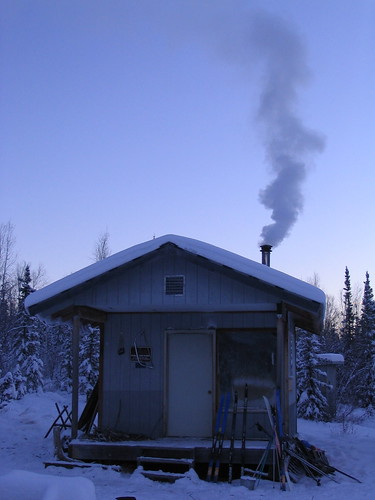
Backwoods cabin.
(*Photo by Tom Kurk, Creative Commons.)
January 19, 2013 Reflections on the Aromas of January
In the month of January our senses seem sharper and that applies to smell. In fact, certain aromas trigger our memory to mostly good times from the past. Consider how the aroma of oven-fresh baked goods or freshly-brewed coffee takes us back to Mama's kitchen or the local gathering place.
During this month we will continue to include some of the texts found in our new black-and-white photo book, Appalachian Sensations: A Journey through the Seasons. We urge you to obtain a copy on this website for yourselves and friends and enjoy contents at leisure.
Curling Wood Smoke from a Cabin
The sons of Aaron must burn this part on the altar,
in addition to the holocaust
on the wood of the fire.
It will be a burnt offering
and its fragrance will appease YHWH.
(Leviticus 3:5)
The cabin smoke means occupancy, wellbeing, good will,
and a sense of domestic tranquility. However, smoke elicits
an ambivalence, a host of human reactions, some good and some not so. Our ancestors in the faith considered an altar sacrifice with its wood‑fueled oblation as an appeasement or as a thanksgiving offering. Most certainly, is the pungent odor of roasting meat widely liked by hungry people? Did the Almighty make our mouths to water at the aroma of roasting beef?
The scent of wood smoke triggers serious or festive modes depending on circumstances. We all respect fire and our basic attraction stretches back in history; instinctively, we are drawn to fire's sight, sound, odor, and warmth -- for the first human conquest was the capture of fire. A whiff of smoke recalls the creature comforts of a heated place and ample food, or it may set off fire alarms in our brains. A smoking factory chimney has signified employment and, more recently, dangerous air pollution.
Prayer: Lord, our sense of smell does not remain dormant during this winter season, but seems all the more active. Help us to find sensations that are dear to us, and which can trigger our memories of many blessed events in the past. Bring back to us the many situations that show your kindly love for us in the gifts we have received through others. Help us enjoy the moments of goodness that you give us, and to be willing to communicate them to others in a pleasant fashion through our activities.

Feathers of the Northern Flicker, Colaptes auratus.
(*photo credit)
January 20, 2013 We Are Each Uniquely Called by God
The particular way in which the Spirit is given to each person is for a good purpose. (I Corinthians 12:7)
This is the first attempt to entitle a reflection as "Unique," and yet this Scriptural passage and theme speaks about God's singular call to each of us. We are all made in God's image and that has infinite possibility; we share humanity; we are unique in the combination of personality, talent, perspectives, and choices. God as source of differences is worthy of celebration. It's great to be ourselves and we can thank God for it! Our uniqueness gives us much more to share with others. Our brief moment of life can make the world better, benefit those near us, and give us an honored individuality in eternal glory. Far better to be unique than to be within the masses, an advancing army, a crowd yelling in unison, or a singing throng. Yes, the orchestra, band, and choir demand singular contributions and that gives them quality.
We are uniquely fashioned in the patchquilt of God's creation, and those innumerable genes within us include those similar and those uniquely different from the person beside us. We have our particular likes, visions, abilities, dreams, goals, temptations, and calling -- and these go beyond being gene determined. Our choices are simply unique ones that we are to make so as to be accountable before the judgment seat on the final day. In one sense, uniqueness indicates the vast array of possible responses; in another sense possible reality is frightening. I have to stand alone before the Lord, and others will not speak on my behalf.
Think of responses by the saints: Thomas More, Mother Teresa, Paul the Apostle, Perpetua, Francis Xavier and on and on. Each has a special gift, a special calling, and a special response of which God's grace was at work throughout. Notable people do not have a monopoly on uniqueness; rather, histories of many go unrecorded beyond the short memories of those close to them. Recall friends and relatives who were very unique in addressing problems or having a sense of trust or sharing for others. Even those who fail have had an opportunity to make a uniquely beneficial mark on society.
Our similarities are easier to know than our differences. In similarity we avoid differences to become unified in action -- a successful game, trip, or project. If God creates us as individuals, then part of our respecting and honoring God's handiwork is to encourage others to develop their God-given talents in ways we could never do ourselves. A supporting word is valuable to the young who have talent socializing with their peers and being charitable and of service to others in special ways. Even their caregivers all too often regard corrective measures as the extent of entering into another's development. Encourage all to hold the talents and uniqueness of others in high regard.
Prayer: Lord, give us the insight to see the precious life of
our neighbor and to assist them in seeing their own potential.
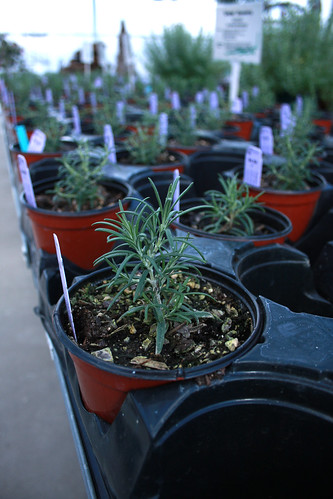
Young herbs, waiting for spring.
(*photo credit)
January 21, 2013 Cultivating Tastes for Garden Produce to Come
Let's cultivate our "taste" for gardening and recall that too many begin the garden year too late. My great uncle Louis started making "hotbeds" the day after New Year's (see January 11, 2008). January is a good time to start things, including gardens.
Tasteful planning is needed during dreary indoor months when we anticipate the first good day of the growing year. Plan to plant thirty vegetables in 2013. Review which ones did not do well last year and what candidates are good substitutes for this year. Some are worthy of repeating, especially when considering popularity within the household. Additions deserve thoughtful selection, so frequent your store of seed catalogs and ask advice from green-thumbed neighbors. Use your taste buds to help with selection, and include herbs that can spice dishes made from the garden bounty.
Tasteful garden design is second only to proper variety selection as a January exercise. Each gardener is challenged as to how much land will be tilled in the spring -- and that depends on whether some of your small or large plot is to be allowed a sabbatical (of which about one-seventh ought to be given rest each year). Perhaps it would be wrong to decide exact locations of some vegetables, for they may prove to be good fillers to interplant in small spaces left over when another crop is unproductive, or will take time to come to maturity. Have creative flexibility.
Tasteful record-keeping seems easy before doing actual work, but it can become burdensome. It's great to keep exact records of yields but this can get cumbersome, especially when busy work crowds our summer days. Recordings have future value, and so are worth the added attention. Comparing yields from year to year also satisfies an experimental fancy and improves gardening choices.
Tasteful winter exercise includes starting seeds indoors such as brassicas for late winter or spring transplanting. Often we can do a little more if the weather is not too severe. Now is the time to obtain wood ash for sprinkling on the garden to add needed minerals; take care not to over-apply ashes. Spread some manure if the good days allow outdoor work (our climate in winter is milder than that of some readers). When weather permits cut out weeds from the garden's edge, trim the grapes, and repair the fences.
Tasteful promotion involves encouraging others by a gentle and not oppressive prod to take up gardening.
Note: While we are promoting the black-and-white photo book Appalachian Sensations: A Journey through the Seasons, we note that tastes recorded in the book are different from what we are discussing here. We respect the many ways we encounter tastes.
Prayer: Lord, stir us to reach out and taste your goodness
that comes in so many ways.

The Chaplin River.
(*photo credit)
January 22, 2013 Is Our Consumer-Based Culture Sustainable?
How sustainable is our lifestyle, our economy, our modern culture? One hears much about a Consumer Confidence Index or the willingness by consumers to spend money on commodities. We can trace such indices month-to-month and throughout the years. Two-thirds of the American economy rests on consumer spending, but ought it to be based on this activity? A meaningful life does not have to be gauged by increased consumption beyond basic needs. We can have a good life by living simply, spending little, growing our food, building our dwellings, and assisting each other in a community -- and developing a quality of living index. We could donate or be taxed on surpluses and thus permit more food and better lodging for people in poorer regions or nations. Wouldn't that be more sustainable and lead to a more stable society?
The first fault of a consumer-based economy is the pressure to go out, loose the purse-strings, and buy unneeded products. This may make jobs for manufacturing, shipping and merchandizing, but could other jobs be of a higher ultimate quality, namely servicing people in need, rebuilding the infrastructure, and enhancing the environment? More consumer products mean a drain on limited resources to extract, process, and fashion these into end products. Can our world afford tens of millions of Asians mimicking American consumer excesses?
We consume too much; we waste too much; we become materialists because all the goods obtained do not satisfy us, and force many to strive all the harder for material goods. In fact, the insatiable appetite for goods becomes an addiction. The economy built on a culture of consumption crowds out a sensitivity for sharing with others, for the lack of satisfaction often crates a tension that redoubles the attempt to get enough for self.
The consumer-based culture attracts others who lack discipline in the rat race of unfulfilled satisfaction, and the blindness associated with filling individual needs to the detriment of a needy society. The focus becomes one of competition to outdo others who might take from limited stores what we desire; forgotten is a global vision of genuine need by the poor for proper food, affordable housing, basic education and accessible heath services. The divergence of some with glutted material goods and others unable to establish a necessary livelihood leads to an unstable global security situation. A materialistic answer is to require more military systems to ensure that ill-gotten goods are not damaged or seized by the have-nots of the world. Today the quest for consumer goods by the privileged is truly troubling. Consumer-based economies encourage greed, weaken the structure of our civilization, and cause individuals to seek to imitate those who have a massive store of goods -- all making life unsustainable.
Prayer: Lord, give us the insight to see that the road to a global consumer culture is unsustainable; help us take a lead in converting our economy to a more solid basis.
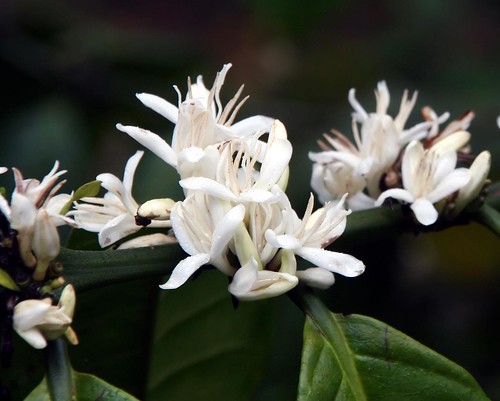
Coffee plant in bloom.
(*Photo by Deepak Bhatia, Creative Commons.)
January 23, 2013 Caffeine Beverages: A Matter of Concern?
With the captivating aroma of freshly-brewed coffee mentioned in last Saturday's reflection, we come to our caffeine-containing beverages that taste so good on cold days. With a host of powerful and very pertinent drugs all around us and misused by a major portion of the population, why bother readers with a review of mildly harmful beverages? January is hot beverage time; nerves can be jangled by overdoses of caffeine, and even heart-rate changes observed. Still there are claims of health benefits from caffeinated beverages (both tea and coffee), and they are championed by drinkers who have nerves of steel.
Concerns arise. I became concerned about my excessive nervousness last year. My doctor said this was due to ingesting too much caffeine (a half dozen cups a day). "Lay off coffee," Dr. Whitman said. As if part of my vow of obedience, I obeyed. To his credit my nerves became better controlled -- but I miss coffee and found hot teas not as satisfying.
Teas can be a coffee alternative. Look up "Herbal Tea" (October 13, 2007). I find herbal teas nice for a change and especially in the summer as a cold drink, but as a regular beverage it does not satisfy everyone, especially former coffee drinkers. Commercial teas have caffeine to varying degrees, with some Japanese ceremonial teas and black tea from the Assam region of India being consistently high in caffeine. In truth, regular commercial teas have only one-third of the caffeine content of coffee -- but even that may be excessive for hot beverage fans. Highly-touted green tea may also be too high in caffeine -- and the Internet is filled with contradictory information on tea contents.
Decaffeinated products can be expensive. Decaffeinated teas are commercially available at reasonable prices but some of us do not like the taste. In fact, some people prefer to decaffeinate their own favorite teas, but here some of the methods suggested such as 30-second infusion are not as accurate as hearsay might indicate. The half-minute infusion of either the tea bag or loose leaf tea (pour off this washing and then brew) does not remove 80% of caffeine as was touted, but rather scientific analysis shows it takes six minutes to remove that much -- and one would not want to drink the second cup. Caffeine is also found in cocoa but fewer regular drinkers exist. Also, chocolate-lovers must beware.
Decaffeinated coffee is expensive and yet some brands have satisfactory tastes when favorite caffeine coffees must be abandoned. However, this requires acquiring new tastes and not overusing God's gifts to us, for we are all to be moderate in all practices. Some decaffeinated coffees have small residual amounts of chemical agents and these might become harmful with repeated ingestion. Trace amounts can add up for coffee drinkers -- though freeze-dried procedures are promising.
Prayer: Lord, give us the grace to be moderate in all things.

Eastern Towhee, Pipilo erythrophthalmus, Estill Co., KY
(*Photo by Sally Ramsdell)
January 24, 2013 Support Bereavement Programs
One of my parishes (Our Lady of the Mountains) invited a highly talented parishioner from our twin Cincinnati parish who is a bereavement specialist. She volunteered time to address the hurts of many who have recently lost a loved one. Parishioners and people in the larger community attended and vouched for discovering that others suffer in much the same manner as they do -- a hidden group of co-sufferers seeking community. Often the experiences of others reveal more hurtful conditions, such as survivors of suicide victims. Comfort comes in compassion for and with others.
Comforting is an earthhealing exercise -- The act of comforting the sorrowing is an act of mercy, and works to the betterment of the individual and also to the greater society. In fact, in helping to heal one person, a resulting ripple effect goes out to all the world, for just as sin has a social impact, so does healing. If we comfort those who suffer among us, a magnetic comforting wave of compassion goes out to suffering people in distant places. Healing improves the total quality of human life.
Recognize the need -- It is to the credit of a parish that bereavement is a fact, especially in the lives of people who lose a spouse or another with whom they had life-long attachments. Larger parishes sometimes have at hand specialists or members trained in bereavement care. The need is great because losses of a loved one and readjustment to normal life cries for recognition and addressing. We all need to be sensitive to needs of such sufferers, discover who they are, and offer needed attention.
Recognize resources -- Some trained people are excellent at doing hospice work or assisting people with depression. They make this a professional occupation, and as experts are certainly deserving of making a livelihood here -- and with proper compensation. They become a resource worth inviting to bring treatment to sufferers. Obviously, small parishes with limited financial resources are strapped. One answer is that gifted people who have worked years in human services could take this on as a retiree volunteer program.
Follow through after funerals -- Bereavement is needed at certain special times that can be shortly after, or delayed from the time of the loss of a loved one. We must be sensitive to times of birthdays, anniversaries, and holidays when the bereaved hurt much. Generally, there is a delayed effect since funerals are busy times with many details. People are struck at different times and in unexpected ways. Some people have activities or other partners and adjust to a bereavement period better than others, but some suffer intently and even undergo depression. Be sensitive to their needs. Visit or make a phone call, or just keep in touch.
Prayer: Lord, give us the grace to comfort those who have endured the death of loved ones and need adjustments in life.
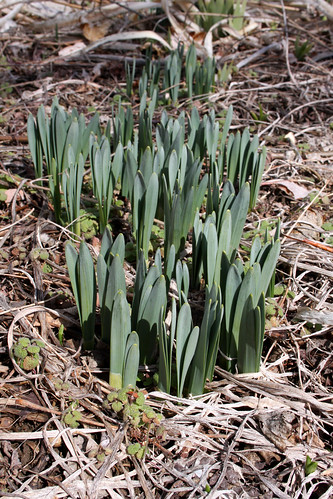
Daffodils spotted in Kentucky, mid-January!
(*photo credit)
January 25, 2013 Overcoming Lethargy on Climate Change Denial
On the Feast of the Conversion of St. Paul (when he was struck from a horse), we wonder if such dramatic actions are needed to change our highly competitive and busy culture and to understand impending dangers. We reflected two years ago (February 10, 2011) on confronting the winner/loser syndrome by seeking to develop win/win situations, namely, be first to give service to another.
Breaking the lethargy barrier in creative ways where there is no loser and only winners is a challenge in our hyper-competitive age. Who is not caught up in school, athletics, business, quiz game, civic program, political agenda, or even a church bent on sheep-raiding another? While some success can be reported in one group excelling over another in one arena, still there is something profoundly unchristian about hyper-competitiveness. To convert from a bad manner of acting to a good one is not to have a loser, except if it be a drug dealer or prostitution ring. Conversion to something better when competing with oneself is ultimately a win/win situation -- and better use of resources fit this picture.
Climate change is a major environmental concern. Here a change in awareness of the seriousness of the problem is occurring, but not fast enough. If this awareness does not extend to power-brokers and big-energy producers, a disaster is looming in our world. A change of heart may demand that certain energy sources (fossil fuel and nuclear) will diminish and that some (renewables) will increase along with energy efficiency practices. Ultimately the economy can improve while the environment is protected and enhanced. Some may suffer unless they convert to sustainable ways.
Conservatives are targets of a concerted effort at addressing climate change by those casting doubt on current scientific evidence, namely Big Energy. The message is "do not tinker with the status quo." The gullible are directed to examples of some world-changing natural phenomena that supports an argument that human beings have little effect on climate or weather. The professional merchants of doubt cast seeds of distrust, (e.g., the issue is not proven), saying that citizens ought to defend the profit-making propensity of the privileged few. An authentic conservative approach ought to be "don't mess with nature."
Neglecting climate change is a formula for global disaster. In an allied manner all (conservatives and liberals alike) ought to opt for a simpler way of using resources and that certainly includes our energy sources. Waste less; be more energy efficient; convert to renewables; save money; emphasize service-oriented jobs; grow some of your own food; pay fair taxes. All of these ought to be conservative values if people only stop and think. Converting people to this philosophy is a true challenge.
Prayer: Lord, give us a deeper understanding of how we can confront and address those immersed in accepting the message of deniers of human-caused climate change.

Accumulated ice on the dried teasel, beautiful sight.
(*photo credit)
January 26, 2013 Discussing Negativism without Being Negative
This is the date of the Full Wolf Moon, and there is always the lore of full moons bringing out the worst in people. The challenge here is "how can one speak of negativism without being negative?" In a spirit of realistic optimism, let's try.
Total negativity is a no-brainer. Were you ever asked to make comments and found that saying something sounded quite negative? It comes with far less time, words, and thought process than to say something positive. In fact, we are tempted to believe that a wise negative comment shows how much more we know about a given subject than others. The invitation allows a growth in stature by being profoundly negative and even saying how much it is beneath our dignity to go any farther. After a sharp condemnation, we conclude it is not worth our while to say more for it distracts from our ordinary business.
We have to confront our personal negativism. Far harder is it to find positive suggestions that would really work in a given situation. This requires that we rid ourselves from an initial judgment that it just won't be a success and our duty is to say so in polite ways. There is almost something bureaucratic in discovering a good excuse to move on, and the negative signpost is the best invitation. Positive approaches may invite further reflection, and thus negativity becomes our way of curbing involvement. But this invites us to an internal review.
An optimistic person helps. The best way to guard against negativism is to disassociate oneself from negative people -- and some through personality, financial difficulties, imitation, poor health, or pure depression are in such a situation. They may be in need of our help, but we have to keep a certain distance as well. For the sake of healing we must have a basic optimism that the practice is possible. Thus, to carry on we may need a dose of optimism just prior to a meeting with the anticipated negativist.
Humor breaks the spell. Face it, every person who thought the world was to end tomorrow has been wrong. Is it optimistic to expect it to continue for the next twenty-four hours? Inject a dash of humor and confront the Chicken Littles with a chuckle and a positive comment. You may even succeed in getting them to take themselves a little more lightly.
Negativism hinders our work. We can always find fault with others or even with ourselves if we look for it. But revealing faults may be somewhat negative. Look for the good ahead and invite the other person to do likewise. Rather than accentuating the negative, take a positive approach and find benefits in changing a position. The world can be better if we try.
Prayer: Lord, give us grace to always be positive, for you have saved us and allowed us to enter into your preparation of the kingdom. Help us see that ministry is a positive benefit to all.
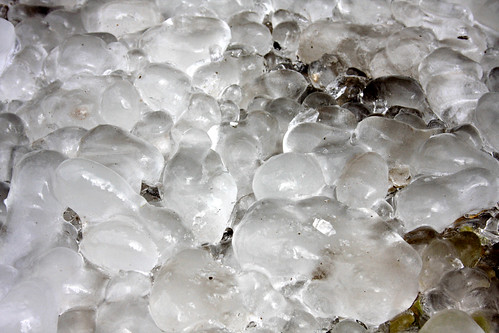
Partially-melted iciles, re-formed at morning.
(*photo credit)
January 27, 2013 Semper Reformanda: Always to Be Reformed
"...to bring good news to the poor, to proclaim liberty to captives, and to the blind new sight, to set the downtrodden free, to proclaim the Lord's year of favor." (Luke 4:18)
The mission is an urgent one, and it takes people who are purified to proclaim it and live it interiorly. We need not be perfect to start the process, for none of us are, but we must commit ourselves to be on the road to perfection. We are to seek reformation as an integral part of our mission to spread the Good News. The more we commit ourselves to striving for perfection, the more we express the urgency that actually exists. Individuals or groups that call for reform and do not have internal examples of reform as part of their mission can easily succumb to an atmosphere of hypocrisy.
I need interior reform! This is part of the mission of external proclamation. Continually I must undergo self-examination lest I become proud of my accomplishments and lacking in self-control and proper integrity for the vast work ahead. My gifts are from God and, while truly gifts, they are to be made better by a constant review and double checking with others who give good advice; the critical ones see things I cannot see myself due to my human blindness. The key to helping others through their blindness is to accept help in overcoming my own. None of us living on Earth have arrived. We are all on a journey together.
Churches need constant reform, not to take pride in being already reformed as though blessed with a permanent condition. Churches are called to mission just as much as are individuals. All institutions must discover the God-given grace of undertaking a cleansing process that will freshen and make them more ready for the mission ahead. The words in the Quotation above are those that begin the ministry of Jesus. We ought to repeat them as part of our own ministry as well, for the important work initiated by Jesus two millennia ago is not yet complete. We are the Lord's hands, feet, and public mouthpiece.
Urgency includes championing self-denial, simplicity of lifestyle and a conservation ethic. We must come to know our place, our times, and that we cannot do this alone; we need to work together. In all due humility we must join forces with others, for the conditions are such that self-deception is tempting. We single out individuals who are changemakers, the leaders and prophets, but they also are not immune from critical review. Liberation is required and needed by all; the announcement of Isaiah's words and Jesus' proclamation opens the way to freedom. We help bring this about; we are imperfect clay, but open to becoming better at the task at hand through God's grace and good teamwork.
Prayer: Lord, teach us to be willing to work with others in bringing about change in our troubled world, and to see that
this work requires our constant self-examination.

Following the racoon.
(*photo credit)
January 28, 2013 Tracking and Footprints in the Snow
In January we move about outside and are not alone. The wintering wildlife is not all hibernating. An art of tracking these hearty residents of the woods is well worth acquainting oneself with. I can identify deer, rabbit, and a few other hoof and paw prints, but naturalists can tell much by the tracks in mud, sand, or snow. It is impressive how much can be learned by how these creatures touch the Earth in a moment of passing -- their destination, search for food, etc. Touching Earth appeals to us because we are temporary travelers and must travel lightly. The snow cover is a temporary record of this journey. In one sense we are discomforted that the first trailblazers got there ahead of us and disturbed the tranquil snow scene, but then why shouldn't they?
Once again we mention our recently available photo book, Appalachian Sensations: A Journey through the Seasons. The portion that deals with touch and feeling is very important at all seasons, but especially with snow cover. I recall seminary students who came from tropical lands and saw snow for the first time. Their joy was childlike, and shortly they discovered that snow is cold and, when melted, wet -- and so they had to be properly geared. To touch winter's delights means preparing ourselves well.
January -- Playing in the Snow
How beautiful on the mountains,
are the feet of one who brings good news,
who heralds peace, brings happiness,
proclaims salvation, and tells Zion,
"Your God is King!" (Isaiah 52:7)
Our footprints are part of our bonding with our mountains.
But footprints need to be gingerly made, not creating a lasting
imprint. Rather, footprints are expected to fade quickly. Our bare feet are more sensitive to the soil than shod feet. We know the land's roughness or softness, its warmth or coldness. I remember the warm cow paths weaving through the ragweed patches in the sunlit meadow in late summer; I remember the sharp cold November grass when I walked barefoot as late as possible.
Making footprints creates an unforgettable sensation, a closeness to Earth. They add beauty to the mountains, for they celebrate the dedication of those who bring Good News. It is better that our mountains feel the footprints of people present than that they be depopulated and lacking them. Nature is best when glorified, touched by human presence, and bearing the imprint of our feet. In turn, our presence should include lightly trod footprints, not the heavy-footed tracks of bulldozers and massive earth‑moving equipment. May we respect the delicate land on which we tread!
Prayer: Lord, allow us to touch the Earth with deep respect.
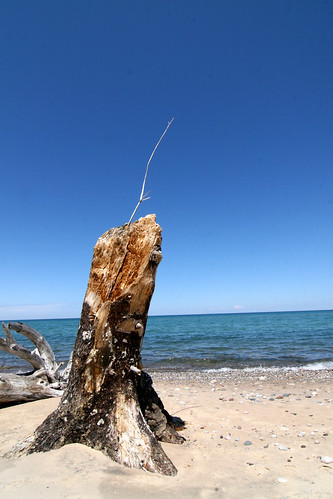
Gentle waves against blue sky.
(*photo credit)
January 29, 2013 Promoting Renewables: Tidal Energy
During this year we will mention various renewable energy sources that could help give our nation energy independence without resorting to more oil, gas, and coal extraction. We suggest solar, wind, geothermal, biofuels, and varieties of hydropower such as currents from impounded lakes and flowing rivers as well as the waves and the tides (see May 21, 2012). In some of these sources, the initial capital outlay could be met by private sources along with being a sound investment of our government with loans repaid over time. Tidal energy is one of these with many advantages:
* Recognized energy source -- The ancient and Medieval maritime states used versions of this source to generate the power needed to turn the mills of those periods. Tide mills have a long modern history in Europe and North America, and in the last century they became a source of electricity generation. New design and turbine technologies make this method even more efficient and able to be used in less pronounced tidal areas. Recent tidal steam generators make this source increasingly competitive as well;
* Proven technology -- The Rance Tidal Power Station on the Rance River in Brittany (France) has been operating successfully since 1966 and has a peak rating of 240 megawatts. The Bay of Fundy experiences the highest tides in the world and could be ideal for utilizing new tidal steam technologies;
* Predictability of tides -- We could say as long as the moon influences our bodies of water, tides will come in and out on a predicted schedule. Tides, unlike solar affected by cloud cover, hydropower affected by lake levels, and winds that blow as they please, have little that can obstruct them -- except if increased suddenly by an extremely rare tsunami.
* Non-polluting -- This characteristic is shared by other renewables, but even to a greater degree since it does not require precious land resources for installment as does solar energy. It only needs land-based transmission networks (already partly in place) to get tidal electricity to consumers;
* Unobstructive -- This source lacks what some regard as unpleasant sound effects of wind generators, only the rhythmic whisper of the coming and going of tides. It is less visibly noticeable than seashore wind farms and does less potential damage to wildlife in air or land;
* Sources near population concentrations -- Tidal power could be harvested at various points of the two dozen ocean and gulf coastline U.S. states and seven Great Lake states. Over one-third of America's population is within one hour's drive of coastlines.
* High potential -- The U.S. Department of Energy estimates that electric generation from tidal and wave sources on shorelines could potentially supply one-third of our electricity needs. Investments, though initially sizeable, have the potential for beneficial payback during the installation's lifetime.
Prayer: Lord of the waves, allow us to gain practical utility of the tides that have mesmerized your creatures for generations. Let the tides of Earth now be of still greater benefit.
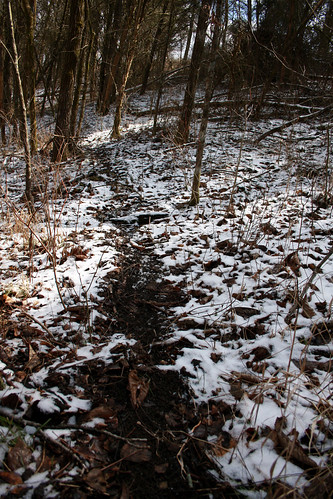
A well-worth path in the snow.
(*photo credit)
January 30, 2013 Offer Prayers for and Ask Prayers from Others
I strive never to write the same reflection twice and must confess these thoughts, though ingrained in me, cannot be pinpointed as subject to a reflection. The word "offer" does not appear in my title search, nor "ask" in relation to prayers.
The Power of Offering: I have gotten into the habit of telling people with problems or in need of support that I will offer a day of sacrifices for them or their loved ones. We are part of the community of the suffering on Earth and my sympathy, listening ear, and often weak advice is not sufficient. Offering help to another must include praying for them. At times some people do not hear or value the offer or forget it in a minute. However, the majority -- even unbelievers -- are grateful. Perhaps, just perhaps, others will adapt the same practice. An added benefit is that when we offer a day for a person we strive to do better that day and thus improve on our spiritual growth.
The Power of Requesting: The rest of the reflection is not really an opposite gesture but a participation in the community of prayer in this world. When someone asks me for food or alms, I request a prayer in response for I am as much a beggar of God's good gifts as they are. A joint request is a better way of doing things, for to give in charity can become a weapon of power or an appeaser of consumption or excessive possession more than being a pure act of love. Furthermore, those who suffer from hunger have a powerful intercessory power if they but see it in the global scheme of things. Thus they may be people in need, but part of the need is the unique power of suffering for and giving help to others. God hears the cry of the poor.
The Power of Communal Awareness: We request because we are in need of prayer. We give because we must, and we ask because we must. The cooperative efforts of our world community means that what is held in common is worthy of sharing. The poor who are closer to God have a precious closeness to the aurora of Divine Mercy than many of us who regard ourselves as without need. Seeing the poverty of others helps us to see our own spiritual poverty. Over time, I have found that some people have never been asked for prayers, and certainly not from one who is giving them things. We share mutual needs, and when we beg for their help we show them the value that they have as individuals to help improve our lives.
The All-Powerful Accountant: At times I forget all the people I have said I will pray for. I write down the special intentions for Masses but sometimes forget the name or can't read my writing. In such cases, on days without intentions I offer for those who I have forgotten. In such cases of those of us becoming ever more forgetful, we ask God to do the accounting.
Prayer: Lord, help me keep straight my offerings and move us to beg for the prayers of those with whom we give assistance.
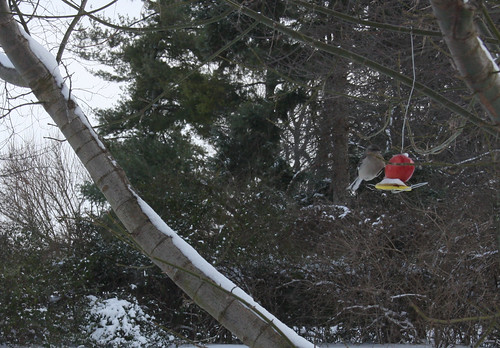
Mockingbird finds comfort in apple meal.
(*photo credit)
January 31, 2013 Earthhealing and "Right to Die"
Today is Backward Day -- whatever that means. For some of us the discussion of the "Right to Die" may fit that title. Several months ago I heard a discussion of the "Right to Die," or physician-assisted suicide, that was on the November ballot in Massachusetts (and lost). Guest speakers debated on NPR's "On Point" program. The discussion seemed skewed in favor of the existing Oregon law that has permitted assisted deaths in over five hundred cases since 1997. From the pro-choice speakers the practice sounded balanced, rare, and relieving for the terminally ill. Only one opponent was given a shorter period of time.
The opposition to "right to die" raised the real possibility that profit-making insurance companies and certain outside parties would attempt to hasten deaths, because it only costs $300 to administer barbiturate doses for the mentally competent as opposed to months of costly treatment as the terminally ill await death. One volunteer caller spoke of that outside pressure in the case of his youthful son who really wanted to live. Would this option of quicker termination be "suggested" to the person who is under enough pain and fear to color sound judgment? And would other states put such options into law as a pro-choice issue?
One startling statistic in the problem was that only a few took the necessary mental evaluation of their terminal condition in Oregon where it seemed to be required. Quality of life is improved with effort and people are helped in every way possible. Were many of those depressed given an easy option for suicide when they could have received quality hospice, palliative care, and spiritual assistance in their current state?
The battle will go on and the possibility of abuse will be present. Certainly, someone does not have to prolong life with forced feeding or other drastic means beyond ordinary treatment. We are to be prepared to die and so extensive and costly methods of prolonging life do not have to be undertaken, which in themselves reduce one's quality of life. But extending care is a route to assisted suicide is a tragic option. Many of us have signed that we don't desire unusual extensive procedures for we are poor folks.
Spiritual assistance can improve dying with dignity. Even in dying we can have a quality of life quite worthwhile, if we offer up our own sufferings to the Lord for the good of others. This offering can then become a precious lode of grace-laden help to those near and far. To suffer with others, and with the Lord at the appointed time for us, is to live a high quality of life even in dying. We do not have to undergo suffering that can be easily relieved by good palliative care, but a "right to die" option is frightening and fraught with abuse.
Prayer: Lord show us what it means to choose to die by offering our sufferings for the good of others, a choice that contains a deep sense of dignity in our final days. |